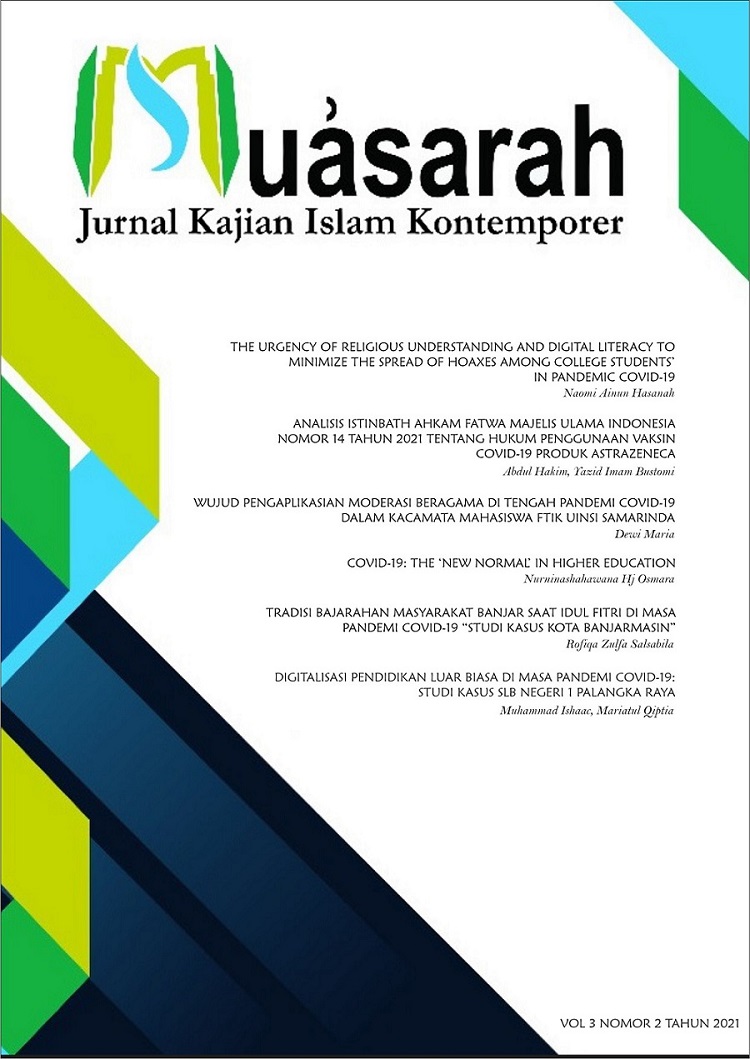THE URGENCY OF DIGITAL LITERACY TO MINIMIZE THE SSPREAD OF RELIGIOUS HOAXES AMONG STUDENTS OF ISLAMIC UNIVERSITY IN PANDEMIC COVID-19
DOI:
https://doi.org/10.18592/msr.v3i2.5957Keywords:
Covid-19, Digital Literacy, Hoax, Religious Understanding, StudentsAbstract
The development of information and communication technology increase the accessibility to get information through digital devices. In addition, the spread of Covid-19 in these few years increases the need to use digital devices and applications to expand knowledge and sharpen understanding among students of Islamic universities. However, the spread of hoax information related to religious understanding increases. A lack of basic religious understanding can trigger the spread of excessive hoaxes. This research aims to reveal the urgency of digital literacy and religious understanding, especially for students in Islamic universities. The Method of this research is Library Research. This research shows that digital literacy and religious understanding are essential to minimize the entry of extreme ideas and the spread of hoaxes. Therefore, every student of Islamic university should increase digital literacy skills and religious understanding through other authoritative sourcesReferences
Aliasan. 2017. “Pengaruh Pemahaman Keagamaan Dan Literasi Media Terhadap Penyebaran Hoax Di Kalangan Mahasiswa.” JKIP: Jurnal Komunikasi Islam Dan Kehumasan Vol. 1 (2): 126–47.
Anisa, Azmi Rizky, and Ala Aprila Ipungkarti. 2021. “Pengaruh Kurangnya Literasi Serta Kemampuan Dalam Berpikir Kritis Yang Masih Rendah Dalam Pendidikan Di Indonesia.” In 1st National Conference on Education, System and Technology Information, Vol. 01:01. 006.
Cahyono, Habib. 2019. “Peran Mahasiswa Di Masyarakat.” De Banten-Bode: Jurnal Pengabdian Masyarakat Setiabudhi Vol. 1 (1): 32–43.
Christiany, Juditha. 2018. “Interaksi Komunikasi Hoax Di Media Sosial Serta Antisipasinya.” Jurnal Pekomnas 3 (1): 31–44.
Dulkiah, Moh, and Paelani Setia. 2020. “Pola Penyebaran Hoaks Pada Kalangan Mahasiswa Perguruan Tinggi Islam Di Kota Bandung.” Jurnal SMART (Studi Masyarakat, Religi, Dan Tradisi) 6 (2): 1–15.
Kemenag. 2019. “Penelitian BLAJ: Literasi Keagamaan Mahasiswa PTKIN Dominan Bersumber Dari Online.” Kementrian Agama Republik Indonesia (blog). July 11, 2019. https://kemenag.go.id/read/penelitian-blaj-literasi-keagamaan-mahasiswa-ptkindominan- bersumber-media-online-gxyaq.
Kurniawati, Juliana, and Siti Baroroh. 2016. “Literasi Media Digital Mahasiswa Universitas Muhammadiyah Bengkulu.” Jurnal Komunikator Vol. 8 (2): 51–66.
Limilia, Putri, and Aristi Nindi. 2019. “Literasi Media Dan Digital Di Indonesia: Sebuah Tinjauan Sistematis.” KOMUNIKATIF: Jurnal Ilmiah Komunikasi 8 (2).
Murdy, Khairi. 2020. “Kompetensi Literasi Digital Mahasiswa STKIP ‘Aisyiyah Riau.” Jurnal Inovasi Pendidikan Ekonomi (JIPE) 10 (1).
Murdy, Khairy, and Asri Neri Putri. 2020. “Kompetensi Literasi Digital MahasiswaSTKIP ‘Aisyiyah Riau.” Jurnal Inovasi Pendidikan Ekonomi (JIPE) Vol. 10 (1): 71–77.
Rahmadhany, Annisa, Anggi Aldilla Safitri, and Irwansyah. 2021. “Fenomena Penyebaran Hoaxdan Hate Speechpada Media Sosial.” Jurnal Teknologi Dan Informasi Bisnis Vol. 3 (1).
Sanusi, Anwar. 2016. Metodologi Penelitian Bisnis. 6th ed. Jakarta: Salemba Empat.
Silvana, Hana, and Cecep Darmawan. 2018. “Pendidikan Literasi Digital Di Kalangan Usia Muda.” Pedagogia : Jurnal Ilmu Pendidikan . 16 (2).
Soedarto Harjono, Hary. 2018. “Literasi Digital: Prospek Dan Implikasinya Dalam Pelajaran Bahasa.” Pena: Jurnal Pendidikan Dan Bahasa 8 (1).
Zed, Mestika. 2014. Metode Penelitian Kepustakaan. 3rd ed. Jakarta: Yayasan Pustaka Obor Indonesia.
Downloads
Published
How to Cite
Issue
Section
License
Authors who publish with this journal agree to the following terms:
- Authors retain copyright and grant the journal right of first publication with the work simultaneously licensed under a Creative Commons Attribution License that allows others to share the work with an acknowledgement of the work's authorship and initial publication in this journal.
- Authors are able to enter into separate, additional contractual arrangements for the non-exclusive distribution of the journal's published version of the work (e.g., post it to an institutional repository or publish it in a book), with an acknowledgement of its initial publication in this journal.
- Authors are permitted and encouraged to post their work online (e.g., in institutional repositories or on their website) prior to and during the submission process, as it can lead to productive exchanges, as well as earlier and greater citation of published work.






